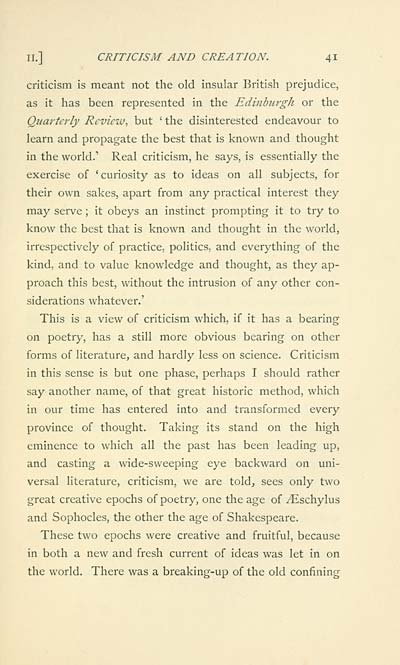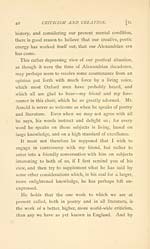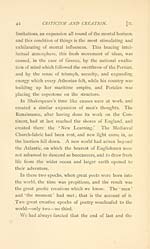Download files
Complete book:
Individual page:
Thumbnail gallery: Grid view | List view

II.] CRITICISM AND CREATION. 41
criticism is meant not the old insular British prejudice,
as it has been represented in the Edinburgh or the
Qiiarterly Rcviciv, but ' the disinterested endeavour to
learn and propagate the best that is known and thought
in the world.' Real criticism, he says, is essentially the
exercise of 'curiosity as to ideas on all subjects, for
their own sakes, apart from any practical interest they
may serve ; it obeys an instinct prompting it to try to
know the best that is known and thought in the world,
irrespectively of practice, politics, and everything of the
kind, and to value knowledge and thought, as they ap-
proach this best, without the intrusion of any other con-
siderations whatever.'
This is a view of criticism which, if it has a bearing
on poetry, has a still more obvious bearing on other
forms of literature, and hardly less on science. Criticism
in this sense is but one phase, perhaps I should rather
say another name, of that great historic method, which
in our time has entered into and transformed every
province of thought. Taking its stand on the high
eminence to which all the past has been leading up,
and casting a wide-sweeping eye backward on uni-
versal literature, criticism, we are told^ sees only two
great creative epochs of poetry, one the age of vEschylus
and Sophocles, the other the age of Shakespeare.
These two epochs were creative and fruitful, because
in both a new and fresh current of ideas was let in on
the world. There was a breaking-up of the old confining
criticism is meant not the old insular British prejudice,
as it has been represented in the Edinburgh or the
Qiiarterly Rcviciv, but ' the disinterested endeavour to
learn and propagate the best that is known and thought
in the world.' Real criticism, he says, is essentially the
exercise of 'curiosity as to ideas on all subjects, for
their own sakes, apart from any practical interest they
may serve ; it obeys an instinct prompting it to try to
know the best that is known and thought in the world,
irrespectively of practice, politics, and everything of the
kind, and to value knowledge and thought, as they ap-
proach this best, without the intrusion of any other con-
siderations whatever.'
This is a view of criticism which, if it has a bearing
on poetry, has a still more obvious bearing on other
forms of literature, and hardly less on science. Criticism
in this sense is but one phase, perhaps I should rather
say another name, of that great historic method, which
in our time has entered into and transformed every
province of thought. Taking its stand on the high
eminence to which all the past has been leading up,
and casting a wide-sweeping eye backward on uni-
versal literature, criticism, we are told^ sees only two
great creative epochs of poetry, one the age of vEschylus
and Sophocles, the other the age of Shakespeare.
These two epochs were creative and fruitful, because
in both a new and fresh current of ideas was let in on
the world. There was a breaking-up of the old confining
Set display mode to: Large image | Transcription
Images and transcriptions on this page, including medium image downloads, may be used under the Creative Commons Attribution 4.0 International Licence unless otherwise stated. ![]()
| Early Gaelic Book Collections > Ossian Collection > Aspects of poetry > (57) |
|---|
| Permanent URL | https://digital.nls.uk/78385956 |
|---|
| Description | Selected books from the Ossian Collection of 327 volumes, originally assembled by J. Norman Methven of Perth. Different editions and translations of James MacPherson's epic poem 'Ossian', some with a map of the 'Kingdom of Connor'. Also secondary material relating to Ossianic poetry and the Ossian controversy. |
|---|
| Description | Selected items from five 'Special and Named Printed Collections'. Includes books in Gaelic and other Celtic languages, works about the Gaels, their languages, literature, culture and history. |
|---|

